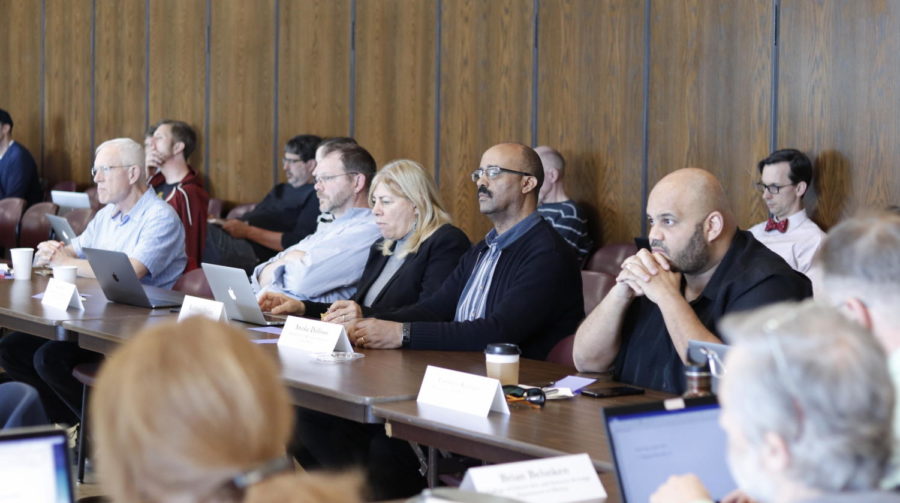Faculty Senate to vote on proposed changes to faculty handbook
Faculty Senate hosted a meeting April 23 in the Sun Room of the Memorial Union. Senate members discussed workday updates, annual promotion and tenure reports.
December 1, 2019
The Faculty Senate will vote this month on a resolution to remove words from position responsibility statements (PRS).
The proposed changes, introduced at the Nov. 12 meeting, remove the words “citizenship,” “collegiality,” “civility” and similar terms from all faculty PRS. The faculty handbook limits PRS to considerations in evaluating performance of position responsibilities, such as teaching, research and outreach.
“In the section defining the PRS, the Faculty Handbook clarifies the content of PRSs: ‘The PRS description itself should be general and include only the significant responsibilities of the faculty member that are important in evaluating faculty accomplishments especially in the promotion and tenure process for tenure eligible/tenured faculty or for advancement or term faculty,’” according to the resolution. “The restrictive term ‘only’ precludes including expectations for faculty conduct or aspects of faculty performance that are not subject to explicit evaluation.”
“Citizenship,” “collegiality,” “civility” and associated terms are not defined in the faculty handbook. There are no standards in the faculty handbook for faculty citizenship, collegiality, civility, etc. They are not defined areas of position responsibility. According to the resolution, the faculty handbook provides no guidance for how to incorporate considerations of citizenship, collegiality, civility et cetera in the evaluation of faculty performance.
The resolution directs colleges and departments to remove “any statement about citizenship, collegiality, civility or other associated terms from every faculty PRS, including PRSs signed prior to the adoption of this resolution.”
During the meeting, some senators said terms including collegiality, while not put in a separate category for evaluation, should be considered in the whole context of faculty responsibilities. Others argued including those words in a PRS makes it easier to get rid of faculty superiors disagree with, or can lead to suppressing academic freedom.
“We are not saying as a Faculty Senate we reject civility or citizenship or collegiality,” said Annemarie Butler, associate professor in philosophy and religious studies. “We are saying these are inappropriate to be included on the PRS because the PRS has an expressed purpose as a tool of evaluation.”
The executive committee introduced the resolution to remind college and department administrators that the faculty handbook governs what a PRS can include.
Senators of the Faculty Senate also worked on a resolution connected with the recent controversial events on campus.
During the November meeting, Senators voted to suspend the rule requiring two readings and unanimously passed a resolution opposing racist incidents that have occurred at Iowa State and supporting the students affected by them. The resolution also supported the constitutional rights of students to protest and called on the entire campus community to support diversity and inclusion at Iowa State.
“The Iowa State University Faculty Senate stands opposed to racism, white superiority, xenophobia, homophobia, transphobia, religious intolerance and other forms of prejudice and bias,” according to the resolution. “We condemn these things both on and off campus. We support our students who have been the targets of racism and discrimination. We support the Constitutional rights of our students to protest.”
During the meeting, multiple senators spoke about how faculty have the power to put action behind words.
“I think it is a powerful statement to come from our faculty to say we are supporting our students who are experiencing this,” said Jordan Brooks, director of equity, inclusion and multicultural student success in the College of Design. “I think when you are in your department meetings, your curriculum meetings making decisions about the experiences we want our students to have, let’s be conscious of our ability to stand up for them then. Make decisions and enact policies that will support diversity, equity and inclusion for all our students.”

















